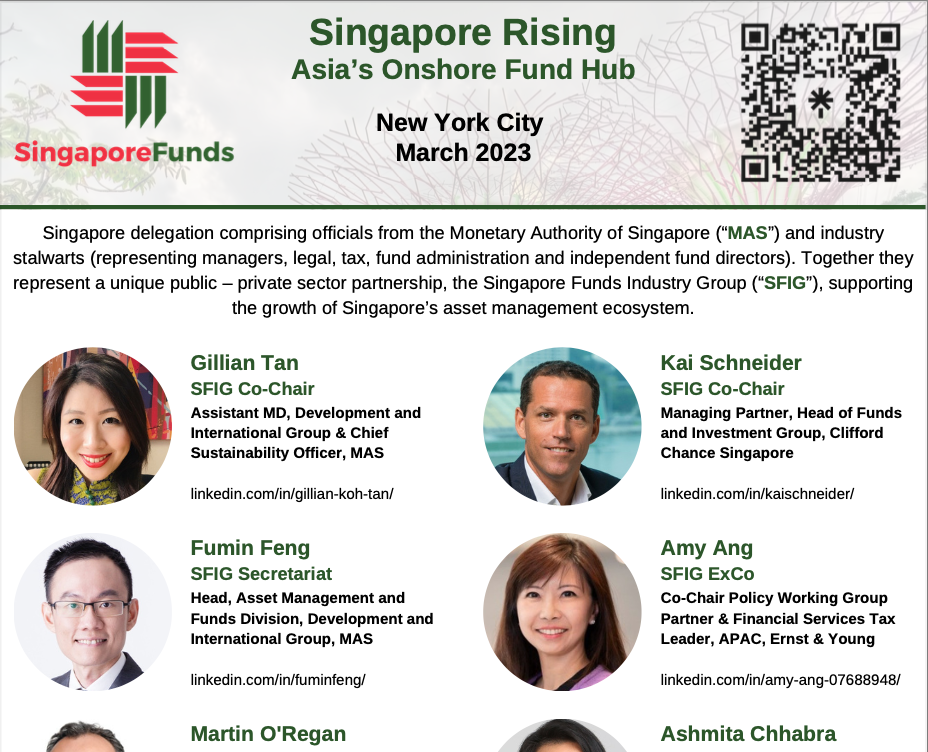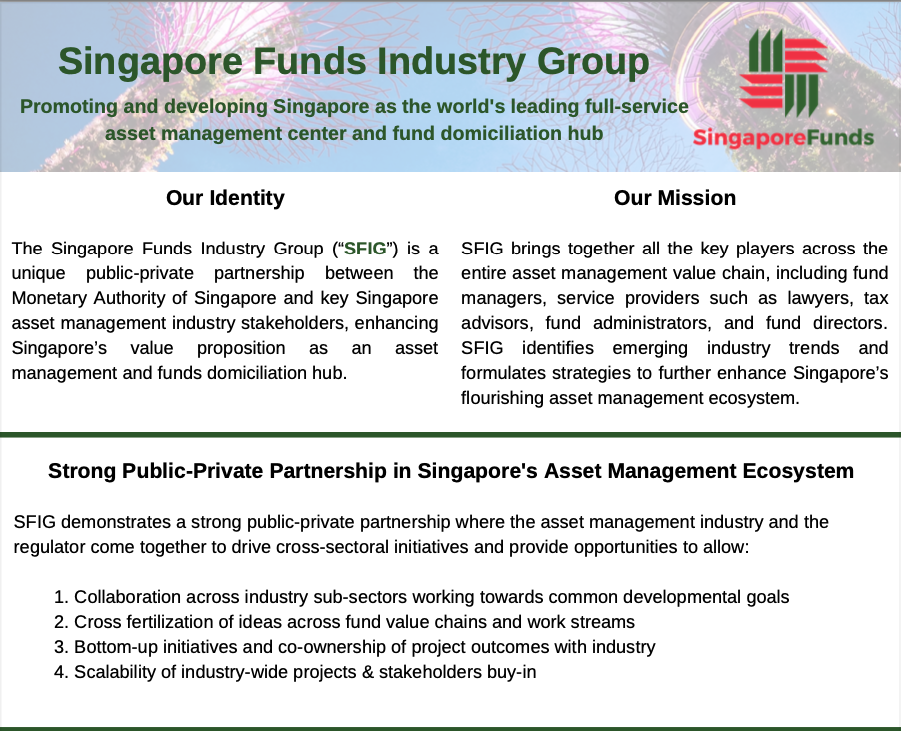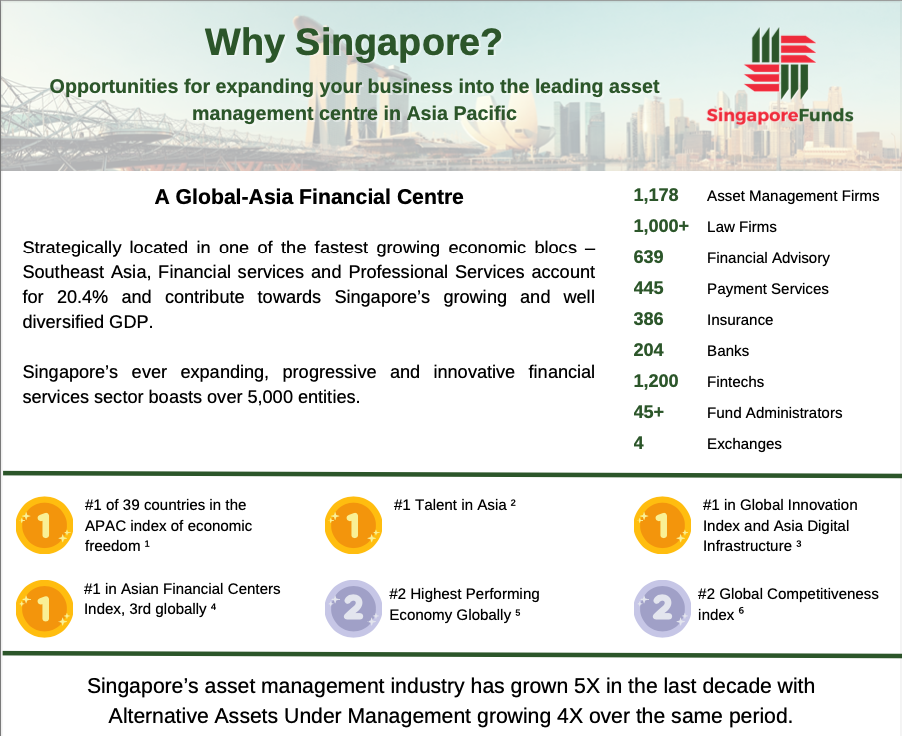MEDIA
-
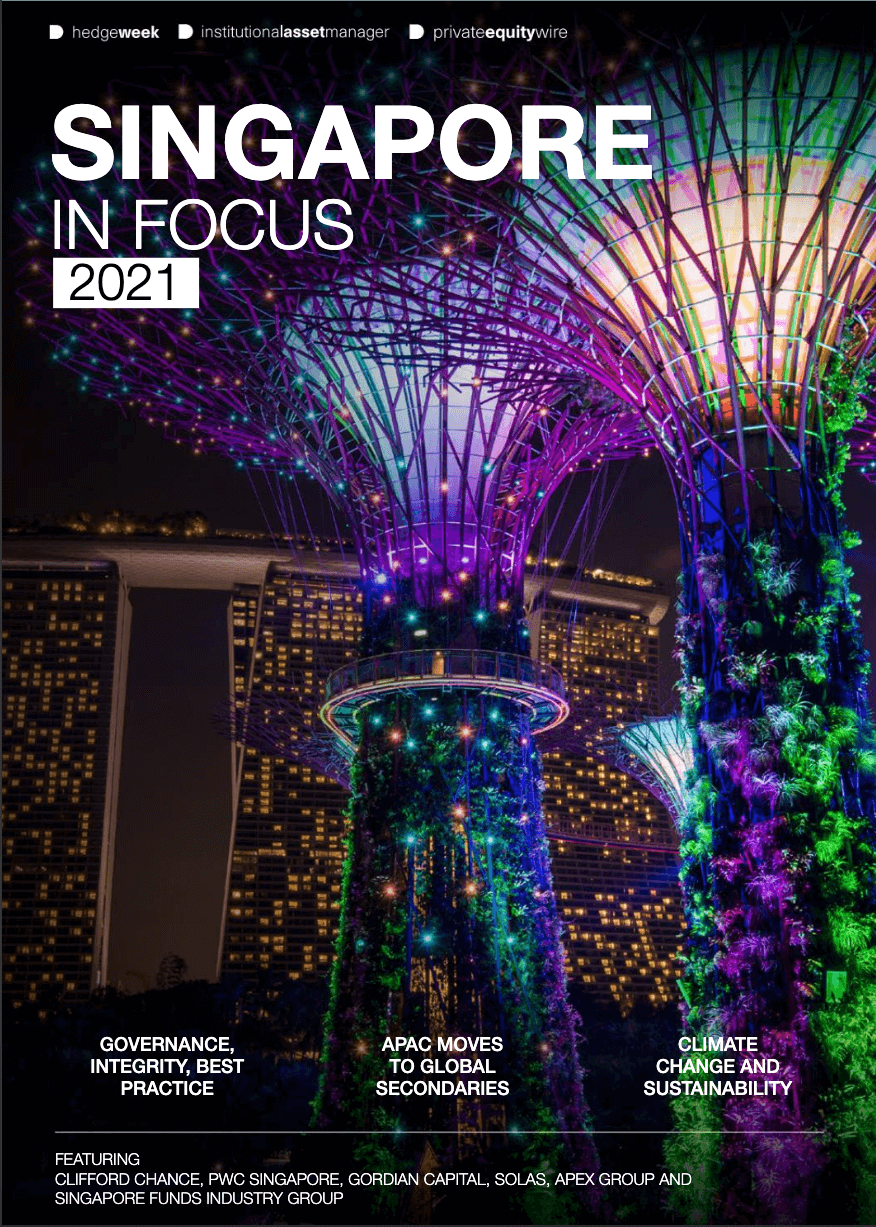
Singapore: The ‘go to’ domicile for Asia Pacific expansion
Singapore: Optimal location for global asset management
Ashmita Chhabra and Mark Voumard, SFIG Promotion & Advocacy – Co-Chairs
Singapore: The Asset Management Centre of the Future
Mark Voumard, Gordian Capital
The global secondaries market: What Singapore-based sponsors can learn
Tom Lin and Morgan Shubin, Clifford Chance
Singapore: Fostering Governance, Integrity and Best Practices
Martin O’Regan, SOLAS Inc
Singapore in the green lane
Armin P. Choksey , PWC Singapore
Singapore: Addressing climate change and sustainability
Ashmita Chhabra, APEX
-
Industry Interviews
This section will feature a series of interviews with asset management industry leaders.
Under our Get-to-know SFIG series, we introduce you to our Co-Chairs.
Please click on the photo below for the interview.-
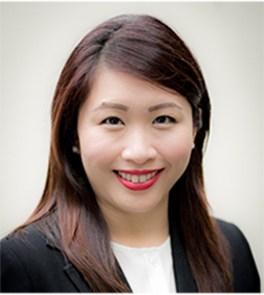
Assistant Managing Director, Development and International Group, MAS
Gillian Tan
-
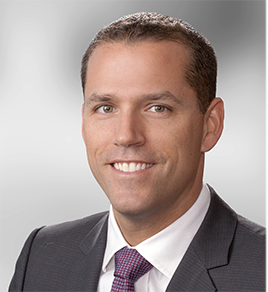
Managing Partner, Head of Funds and Investment Group, Clifford Chance Singapore
Kai-Niklas Schneider
-

Assistant Managing Director, Development and International Group, MAS
Gillian Tan
-
Q: Mark Voumard: Tell us a little about yourself beyond your official bio.
-
A: I grew up in Singapore in the 1980s and save for four years when I pursued degrees in the UK and US, have spent all my life here. My husband is a finance lawyer in private practice and we have three children, who range in age from 15 to 9, and a dog, Harley, who was rescued from an island off Singapore a couple of years ago. On weekends, I can usually be found nagging the children to do their homework or chasing the dog around various dog runs in Singapore (East Coast Park, Jurong Lake Garden and Bishan Park are some of our favourites). Outside work, I serve as President of the Singapore Anti-Narcotics Association, which assists ex-drug offenders in their recovery from drug addiction, as well as their families. We provide aftercare and counselling to support our clients as they reintegrate into the community and also help them find employment. I’ve also been serving on the Board of Governors of St Joseph’s Institution, a secondary school, for the past year and it’s been wonderful working with this group of passionate educators.
-
Q: Ashmita Chhabra: Why did you choose this career or industry?
-
A: My undergraduate and postgraduate degrees are in law. I’ve always enjoyed the analytical rigour and structure that legal training provides, and enjoyed my work as a Justices’ Law Clerk to the Chief Justice and other Singapore Supreme Court judges, Assistant Registrar and later, a District Judge. My first love has always been criminal law and I spent about six years working as a prosecutor in the Attorney-General’s Chambers, covering everything from murder trials to sex crimes and white collar offences appellate work. I was later asked to set up MAS’ Enforcement Department, consolidating MAS’ enforcement function across capital markets, banking and insurance within a specialised team with investigation, legal, forensics and surveillance capabilities. I stumbled into financial sector development, after spending the first 17 years of my career in prosecution, judicial and enforcement roles. When I first moved to MAS’ Development and International Group, it felt like a universe apart from my previous roles, but I’ve really enjoyed learning about different asset classes, meeting industry stakeholders and understanding their strengths and challenges, and working with industry to find solutions and unlock growth. The work is extremely multi-faceted and my vocabulary has definitely expanded and changed significantly since my legal days!
-
Q: Mark Voumard: What differentiates Singapore from other global financial centers?
-
A: One of our strong points is that our financial sector has well-diversified strengths across multiple pillars of financial sector competitiveness. In terms of financial services and asset classes, we have broad yet strong capabilities across wealth and asset management, foreign exchange and derivatives, insurance and risk financing, fixed income, infrastructure finance, as well as FinTech and innovation. They complement and reinforce one another, and draw in a diverse ecosystem of financial services firms, capital markets participants and other stakeholders such as pension funds and multilateral development banks that seek financing solutions or investments across multiple asset classes. Investors also appreciate our pro-business and cost-competitive environment, international connectivity, and our skilled and cosmopolitan workforce. These strengths as well as Singapore’s ability to attract global talent have allowed us to emerge as a leading full-service fund management and domiciliation hub acting as a gateway to Asia. There has also been significant interest in the Variable Capital Companies framework that we launched in 2020, and I think we are well-positioned to grow our fund and asset management sector further.
-
Q: Ashmita Chhabra: What have been the key changes you have seen in the Singapore financial landscape over the last decade?
-
A: I have seen two major changes in Singapore’s overall financial landscape over the past 10 years, both of which are still continuing to unfold today. The first is the growing role of technology and its intersection with many financial services to improve customer experiences, reduce intermediary transaction costs, and make existing financial processes more efficient. We see the technological integration with financial services across a range of areas, including digital banking, mobile payments and the asset and wealth management space. A key focus area for the SFIG is to consider how new technologies can be applied to enhance the funds industry. Our Infrastructure and Innovation Working Group is examining the feasibility of developing fund data and settlement platforms that collect and harness insights through data analytics, streamline manual processes and automate reporting. Deeper recognition of the importance of sustainability and sustainable finance is without a doubt the second key change. Singapore-based banks, insurers, asset managers have been working with the MAS to support the adoption of ESG industry standards and guidelines and encourage industry-led capacity building and training efforts. We also have a US$2 billion Green Investments Programme to deepen green investment capabilities and increase the management of green-focused funds in Singapore. Singapore’s commitment to sustainable finance and the growing investor demand for ESG products is a significant growth opportunity for investment funds, fund managers and service providers that can provide trustworthy, transparent and efficient ESG data and investment services.
-
Q: Mark Voumard: What do you think Singapore can learn from other financial centers and vice-versa?
-
A: As long-term trends such as digitalisation and sustainability continue to transform financial services, Singapore needs to continue to be able to attract new ideas, talent and companies from across the world. This diversity of participation has been fundamental to our financial sector’s success and will continue to underpin its development. I do look to other financial centres to see how they communicate and share ideas, as well as attract talent. An important ingredient of success for Singapore is our well-developed framework for public-private collaboration between MAS and the financial sector. We work closely with industry partners and consult them extensively, and often bring together industry stakeholders from within and outside the financial services sector to work on anything from policy design, industry utilities and capability building. SFIG is a good example of this.
-
Q: Ashmita Chhabra: As Co-Chair, what’s your vision for SFIG?
-
A: My vision for SFIG is that it continues to grow as an inclusive and outcome-driven platform for different stakeholders across the entire asset management value chain to develop Singapore’s funds ecosystem. We need to foster collaboration and cross-pollinate perspectives from innovators, industry participants and institutions so that we can implement effective initiatives and drive the sustainable growth of the Singapore funds industry. Building effective communication channels and collaborative mechanisms between research institutes, the industry and government will help to drive substantive change in the financial sector and I would envision SFIG as a key avenue to bring the various strands of this triple helix together for the asset management and funds landscape. We also see a growing number of funds and complementary fund services that are building their presence in Singapore, and I hope that SFIG will tap on this rich and expanding pool of industry expertise. SFIG’s unique role in bringing together multiple industry players, with different perspectives and considerations represented, will help us position our asset management and funds landscape for future growth.
-
Q: Mark Voumard: What’s your favourite local food?
-
A: Definitely nasi lemak – and I am happy to have it anytime, anywhere, whether it be a $3 version at a neighbourhood hawker centre or the posh version at the Coconut Club.
-
Q: Ashmita Chhabra: Name your favourite local and international restaurants in Singapore.
-
A: My favourite local food place (which doesn’t qualify as a restaurant) is the 88 Hong Kong Roast Meat Specialist staff at a coffee shop along Lavender Street. The queue is almost always very long, but the roast duck and pork are definitely worth the wait. For non-Asian food, it would be a tough fight between Buko Nero along Tanjong Pagar Road and Venue by Sebastian at Downtown Gallery – conveniently, both are a stone’s throw away from MAS. Lucky me!
-
-

Managing Partner, Head of Funds and Investment Group, Clifford Chance Singapore
Kai-Niklas Schneider
-
Q: Mark Voumard: Tell us a little about yourself, beyond your official bio.
-
A: I grew up between the US and Sweden for most of my formative years – initially California and then Washington DC for university and law school and Sweden for a couple of years and long summers. As a result, I had a keen interest to pursue a career in international affairs, and even harbored a dream at one point to become an ambassador! An important driving force in my life has been a love for basketball, having played the sport for over 35 years. Basketball and its team approach have had a profound impact on my life and career -- it provides an enduring lesson on the value of a high performance team mentality. I still play whenever possible, including on weekends at the National Stadium in Singapore.
-
Q: Ashmita Chhabra: Why did you choose this career or industry?
-
A: I have always had a strong interest in politics and international affairs, although I didn't start out with ambitions to become a lawyer. I originally planned to join the foreign service, but ultimately was distracted by law school and then private practice. My undergraduate degree was in international relations, having interned at the White House and for a US Senator. My uncle was a lawyer and dean of a law school – it was a versatile degree with an international law angle, so I decided to attend law school. After my law degree, I transferred to Georgetown University to complete a masters in international and comparative law. I was fortunate to have many practicing lawyers as adjunct professors. Upon graduation, I clerked for a year for a judge in the US federal courts, and even participated in the first 9/11 case, and then entered private practice with a focus on private equity funds. The rest, as they say, is history!
-
Q: Mark Voumard: What differentiates Singapore from other global financial centers?
-
A: Singapore's robust legal regime and favorable tax environment offers stability and reliability to global financial investors seeking a base from which to enter the Asia Pacific markets. Singapore is an attractive domicile for both fund managers and their vehicles and the regulatory reforms introduced by its progressive regulator has driven continued growth of its asset management industry. For example, two years ago the MAS launched the Variable Capital Company (VCC), which simplified the incorporation and redomiciling of funds in Singapore as corporate entities. This alternative vehicle provides flexibility around capital structures and accounting standards, while offering the ability to segregate assets and liabilities and the retention of investor confidentiality. With the ongoing trend to onshore operations and investment structures, the VCC and other Singapore vehicles options provide functional differences that are attractive to international fund managers across all asset classes.
-
Q: Ashmita Chhabra: What have been the key changes you have seen in the Singapore financial landscape over the last decade?
-
A: Leveraging the digitization boom during the pandemic, Singapore's positioning as a regional financial hub has been augmented by the creative implementation of regulatory sandboxes, which enable founders to experiment with dynamic start-ups within defined limits. Although the full value of digitization is yet to be realized, it is no doubt an important moment for funds and asset owners as digitization has become a mainstay strategy to drive competitive advantages, manage risk and unlock new growth opportunities. Another key development is the ongoing integration of ESG factors into investment processes, and ultimately investment decisions. There has been an influx of investment flows as new funds products in Asia begin to incorporate ESG in some form and institutions now require investment impact measures in sustainability terms, such as ESG analytics, assurance and credible ratings.
-
Q: Mark Voumard: What do you think Singapore can learn from other financial centers and vice-versa?
-
A: Singapore has already achieved significant success in capturing a greater share of the international asset management market. To continue its evolution as a global financial hub, Singapore needs to remain aggressive and bold in developing, recruiting and retaining top-notch talent equipped with digital skills. This will enable the city-state to stay ahead of the curve as digitization increasingly affects financial services delivery and financial regulation. Singapore is also an attractive onshore jurisdiction due to its excellent infrastructure, business-friendly environment and double taxation treaty network, which supports the efficient set-up and operation of fund vehicles. Efforts by the MAS and SFIG, such as industry consultation processes to identify new opportunities and stress points, demonstrate a collaborative commitment by private and public sector stakeholders to cement Singapore's position as a competitive international financial hub.
-
Q: Ashmita Chhabra: As Co-Chair, what’s your vision for SFIG?
-
A: I hope to encourage more senior leaders across the funds industry to take an active role in the development and future success of Singapore and its value proposition by contributing their experience and perspectives to identify emerging industry trends, recommend industry standards and lead development initiatives. The coordinating efforts of MAS and SFIG (and its industry association partners) are crucial to drive sustainable development and growth of the Singapore funds industry, and positive synergies between private and public sector stakeholders remain vital to harness Singapore's proposition as an international funds hub.
-
Q: Mark Voumard: What’s your favorite local food?
-
A: That would have to be Laksa!
-
Q: Ashmita Chhabra: Name your favorite local and international restaurants in Singapore.
-
A: National Kitchen by Violet Oon in the National Gallery and Nixta, a Mexican Grill & Bar in Amoy Street.
-
-
-
A Singapore delegation comprising officials from the Monetary Authority of Singapore (MAS) and industry stalwarts (representing managers, legal, tax, fund administration and independent fund directors) were in New York the week of March 20th 2023 speaking to the US funds’ industry.
Focusing on the value that Singapore has to offer for those seeking to expand into Asia, curated meetings were held with major GP’s and Managers representing close to 1 Trillion in AUM, with the theme "Singapore Rising - Asia’s Onshore Fund Hub".
-
Roadshow Flyer
-
About SFIG
-
Why Singapore
-
-
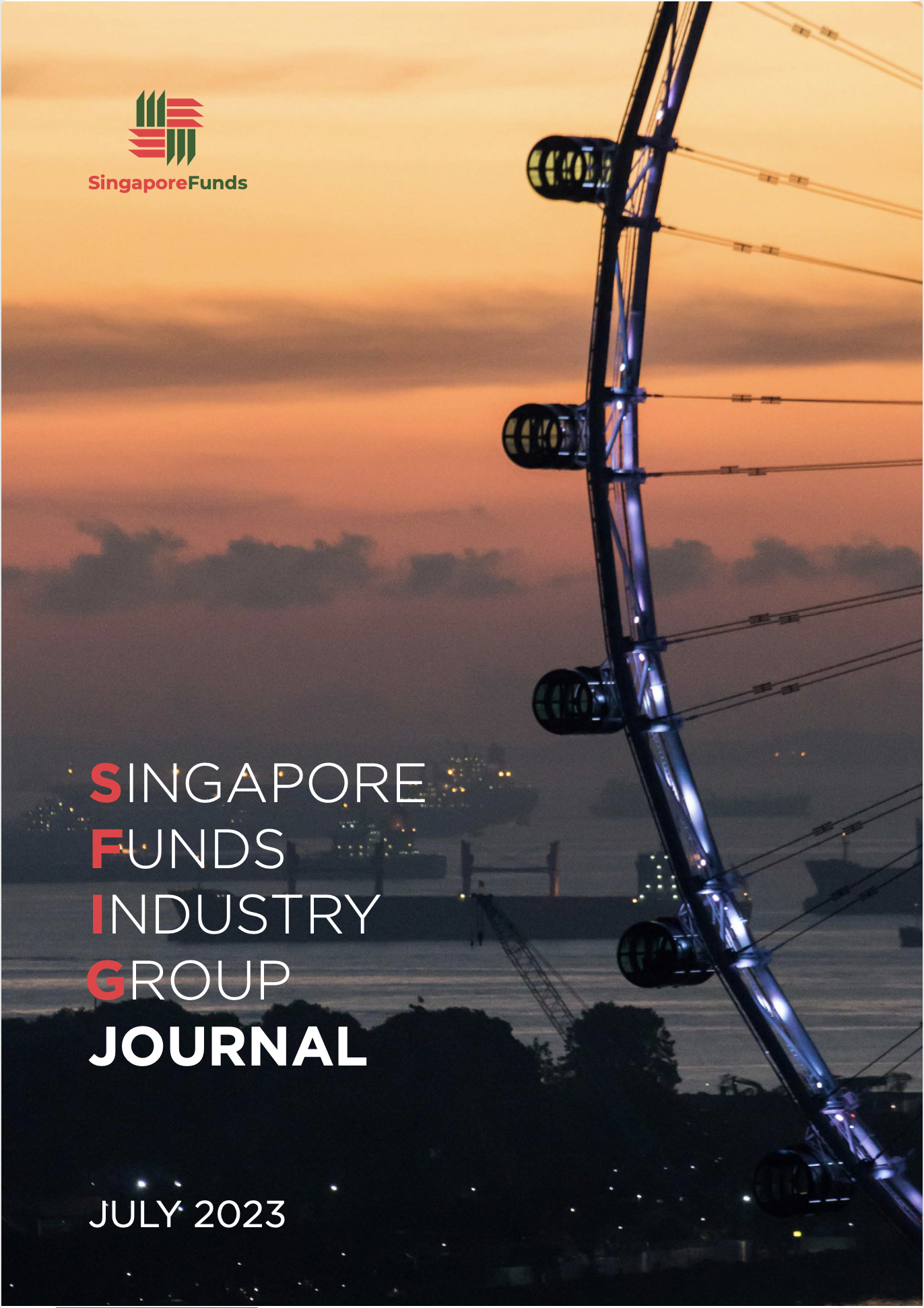
The inaugural SFIG Journal issue
Featuring:
-
A foreword from Ravi Menon, Managing Director of the MAS
-
One of the most in depth, publicly released interviews ever conducted with the MAS, where Ms Gillian Tan, Assistant Managing Director, Development and International Group, & Chief Sustainability Officer explains the MAS’ views on the asset management industry and
-
Dedicated articles from each of the SFIG Working Groups explaining their objectives and sharing current initiatives they are leading.
-
-
-
Inaugural Journal coming soon
-


